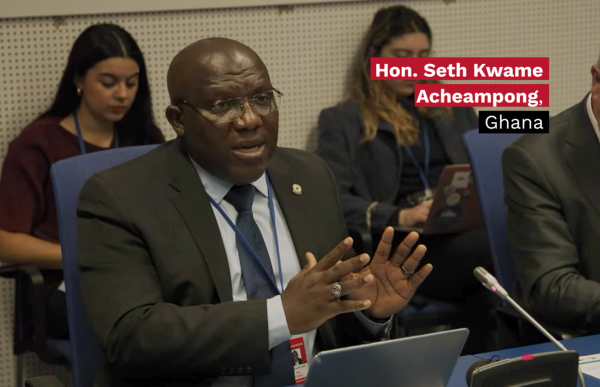Unite Network
Alinear las políticas de drogas y los compromisos en materia de derechos humanos - La 66ta sesión de la Comisión de Estupefacientes y la reforma de políticas en materia de drogas en Ghana
En la CND de este año, las recientes reformas de políticas antidrogas en Ghana sientan un importante precedente de cómo los enfoques de políticas referidas a drogas, orientados por prioridades de salud y derechos humanos, pueden prevalecer sobre el fallido enfoque de la "guerra contra las drogas". Más información, en inglés, está disponible abajo.
The 66th Session of the Commission on Narcotic Drugs (CND) took place in Vienna, Austria from March 13 to 17, at a moment when a renewed push for greater convergence between human rights and drug policy commitments is taking place across the United Nations system. UNITE Member, Honourable Seth Acheampong attended as Head of Delegation of Ghana, highlighting the country’s role as a key supporter of a human rights and public health approach to drug policy, demonstrated by its recent drug law reform.
This year’s session took place in the context of Member States preparing for the 2024 Mid-Term Review of the implementation of commitments made in the 2019 Ministerial Declaration on strengthening actions to address the world drug problem.
This meeting of the CND also followed the adoption of a historic resolution on drugs by the United Nations General Assembly, which featured some of the strongest human rights language relating to drug policy ever adopted. Concurrently to the proceedings in Vienna, negotiations were taking place in the Human Rights Council in Geneva, leading to the adoption of the most ambitious and progressive resolution on drug policy to date, titled ‘Contribution of the Human Rights Council with regard to the human rights implications of drug policy’.
Against this backdrop, while discussions of human rights impacts of drug policies have been historically limited in Vienna, the 66th Session showed promising signs of greater convergence between human rights and drug policy bodies within the United Nations system. Volker Türk, United Nations High Commissioner for Human Rights, addressed the Commission in an opening statement, urging Member States that the 2024 Mid-Term Review provides an occasion to make a renewed, strong commitment to human rights as part of a transformative change to address the global drug situation.
The High Commissioner further highlighted a number of countries that have led the way forward, including Colombia’s efforts towards a paradigm shift in drug policies, as well as the role of Ghana as a key supporter of a human rights and public health approach to drug policy, demonstrated by its recent drug law reform.
